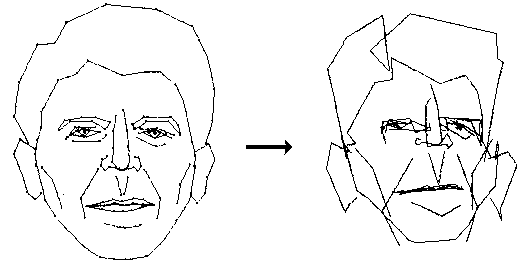THE GREAT COMMUNICATOR
Sun. June 13, 2004Categories: Abstract Dynamics

Brian Massumi:
‘[W]hat is astonishing is that Reagan wasn’t laughed and jeered off the campaign podium, and was swept into office, not once but twice. It wasn’t that people didn’t hear his verbal fumbling or recognize the incoherence of his thoughts. They were the butt of constant jokes and news stories. And it wasn’t that what they lacked on the the level of verbal coherence was glossed over by the seductive fluency of his body image. Reagan was more famous for his polyps than his poise, and there was a collective fascination with his faltering health and regular shedding of bits and pieces of himself. The only conclusion is that Reagan was an effective leader not in spite of but because of his double dysfunction. He was able to produce ideological effects by non-ideological means, a global shift in the political direction of the United States by falling apart. His means were affective.
… Reagan operationalized the virtual in postmodern politics. Alone, he was nothing approaching an ideologue. He was nothing, an idiocy musically coupled with an incoherence. But, that’s a bit unfair. He was an incipience. He was unqualified and without content. But, his incipience was prolonged by technologies of image transmission and then relayed by apparatuses such as the family or the church or the school or the chamber of commerce, which in conjunction with the media acted as part of the nervous system of a new and frightening body politic. It was on the receiving end end that the Reagan incipience was qualified, given content. Receiving apparatuses fulfilled the inhibitory, limitative function. They selected one line of movement, one progression of meaning, to actualize and implant locally. That is why Reagan could be so many things to so many people; that is why the majority of the electorate could disagree with him on major issues but still vote for him. Becausehe was actualized, in their neighbourhood, as a movement and meaning of their selection – or at least selected for them with their acquiescence. He was man for all inhibitions.’
(isn’t this mostly a slightly ornate and abstract way of saying “reagan was primarily an actor”?)* (cf eg why james dean is attractive and affective/effective in rebel w/o a cause? = polyps more than poise: the 70s wz the era that “method” became the mainstream on-screen orthodoxy… wz RR its towering apotheosis? actors are generally “dumb”, when you interview them offstage and out-of-character…)
*(i mean, all policians are actors to a certain degree: but rr was little else) (and judging by his reviews, amamzingly good)
Think it’s more than he was an actor. Maybe it wd have been better if I’d quoted more. Massumi begins with a study done by Oliver Sacks. He looked at aphasiacs, who don’t understand words but who can follow nonverbal cues (body language etc) and agnosiacs, who only understand words but can’t follow any nonverbal communication. Presented with a speech by Reagan both laughed uproariously. So Massumi’s pt was that the whole model of ‘charismatic leadership’ (Reagan was an actor) seems to miss something crucial. The great communicator was a disastrously bad communicator, in both verbal and non-verbal terms.(I was always nonplussed, to say the least, by the description of RR as a ‘great communicator’, in seemed like some kind of weird doublethink: in what sense were Reagan’s bumbling displays, for all the world a model of incoherence, effective communications? Massumi’s analysis starts to give some answers.
i always tht the problem w.that oliver sacks observation was that there’s no contrast (or “control”) in the experiment – who else did they laugh uproariously at? who did they wag their heads sagely at? etc
but yes, i think this is a REALLY interesting topic, enormously under-addressed (i wz being a bit scoffy twds massumis somewhat involved manner of expression, seeing as – esp.right after yr post on potter – i think there’s an issue of speaking-to-the-converted in the jargon, when being a bit more concrete re splits in the performative [there i go again] would allow the “full quota of stockbrokers and manual workers” into the discussion/but that’s a separate issue really)
it’s not just just verbal vs non-verbal communication, it’s also the (pragmatic) communicative effectiveness of the apparent war between them (which is why it made me think of the Method, which foregrounds the mumbles and grunts and the gestures): in some ways this was the main cultural battleground of pop culture in the 50s-70s